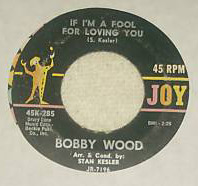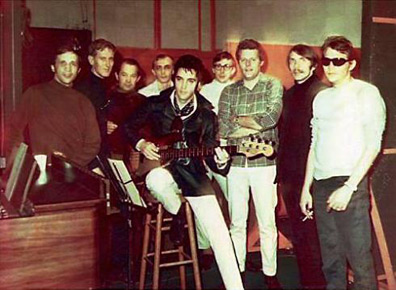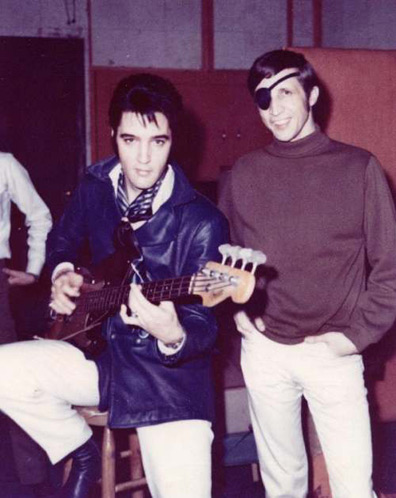Mississippi farm boy, Gospel aficionado, solo artist, songwriter, collaborator with Nashville A-list stars, member of the most successful studio group in history – and very soon, published author. Throughout his remarkable life, Memphis Boys keyboardist Bobby Wood has worn many hats in the music world. Fortunately for fans, he will soon release a book in which he candidly discusses his faith, family, frailties and his phenomenal career spanning six decades that has found him working with a range of prominent stars “from Elvis to Garth” and just about everyone in between.
Born in 1941 and raised on a farm at Mitchell Switch, a community just south of New Albany, Mississippi – just 20 miles and six years from where and when Elvis came into the world – Wood was one of six children in a musical family that delighted crowds as the Wood Family Gospel Group. He recalls that it was his grandfather Walter Wood’s passion for music that inspired his heirs’ musicality. After studying classical music through mail-order lessons, the elder Wood decided that genre wasn’t for him. He then mastered and went on to train others in the American folk music tradition of shape notes.
In rural areas of the American South and Appalachia, the shape note method of teaching and singing is tightly woven into the deeply traditional culture. From the 1800s to mid 1900s, the classes were often a rare opportunity for people to learn music and practice the vibrant, dramatic harmonies and strong rhythm of congregational singing. The roots of most Southern Gospel quartets and performers sprang from this more than 200-year-old tradition (shape note singing experienced a resurgence in popularity after being featured in the 2003 motion picture "Cold Mountain" – the soundtrack of which garnered worldwide acclaim).
Wood’s grandfather taught the seven-syllable "do re mi" system to countless children in communities he reached by horse-drawn buggy and the $2 tuition was paid sometimes with baskets of vegetables. After completing several days of lessons, the musically-enriched children gathered to perform a concert for an audience of proud parents.
Beginning in 1948, Bobby’s father Leslie hosted the Pap Wood’s Gospel Radio Hour and the Singing Convention of the Air, beaming the sounds of praise to the northeast Mississippi masses on Tupelo’s WELO. Before long, the show – featuring singers brandishing their Stamps Baxter and Vaughn shape note songbooks – was broadcast remotely from the Union County courthouse. Each child in the Wood household (Maxine, Irene, Etoye, Billy, Bobby and Jamie) sang and mastered an instrument.
For Bobby, the organ was his forte. From years of singing with his family, he developed amazing vocal abilities. Already an accomplished musician by his late teens, he set forth on Bankhead Highway to Memphis after high school graduation. It was there in the burgeoning Soul capital of the universe where he became Sun Studio producer Stan Kesler’s protégé. Kesler is known best as the man responsible for the formation of the two most successful studio groups of all time: Dixie Flyers and the Memphis Boys.
 In 1964, Bobby released a song on Joy Records – “If I’m a Fool (For Loving You)” – penned by his mentor. The single became a hit. Among the song’s many fans was none other than the Presley paterfamilias, Vernon. With a promising future as a solo artist, the handsome young singer’s plans were violently derailed by severe injuries from a tragic car accident that almost claimed his life while touring in Ohio to promote his breakthrough single. After enduring several agonizing surgeries and months of recovery from his painful, debilitating injuries, he is quick to this day to credit his strong, abiding Christian faith for not only getting him through those struggles, but for guiding him to the next level of his career.
In 1964, Bobby released a song on Joy Records – “If I’m a Fool (For Loving You)” – penned by his mentor. The single became a hit. Among the song’s many fans was none other than the Presley paterfamilias, Vernon. With a promising future as a solo artist, the handsome young singer’s plans were violently derailed by severe injuries from a tragic car accident that almost claimed his life while touring in Ohio to promote his breakthrough single. After enduring several agonizing surgeries and months of recovery from his painful, debilitating injuries, he is quick to this day to credit his strong, abiding Christian faith for not only getting him through those struggles, but for guiding him to the next level of his career.
But what lay ahead was far beyond anything he could have ever visualized in his wildest dreams or asked for in his humblest prayers. As Wood is quick to share, “The Lord has really blessed me.” And to music fans, those blessings wrap our world in an array of sounds that stir our very souls and deeply touch our hearts. The devastation that would have easily turned a man of weaker character toward a life wracked with torturous self-pity and brooding echoes of “what might have been” was indeed conversely the genesis of a new phase of success for the very grounded and resolute Bobby Wood. The stability of studio session work better suited his needs, so he became Sun’s staff piano player. But it would be his motorcycle riding buddy from another Memphis studio who would soon offer the opportunity not only to make records, but also to set records.
American Studio’s Memphis Boys

Wood met ace guitarist, Rockabilly veteran and soon to be iconic producer Lincoln “Chips” Moman, a Georgia transplant to the Bluff City, in 1962 while he was still manning the board across town at Stax Studios. After an acrimonious split from Jim Stewart and Estelle Axton over their failure to properly credit and fairly compensate him for his role in the studio’s successes, Moman embarked with Don Crews on a venture that would attract some of the industry’s most prominent and beloved performers as well as turn raw talent into hot international acts.
The unrivaled success of American Studios was a phenomenal combination of Moman’s uncanny abilities as a sharp, plainspoken producer, the poignant product of his assembly of talented, expressive songwriters… and the seamless sounds of the rhythm section comprised of a half-dozen Southern music men who moved the earth in a way the region hadn’t experienced since the New Madrid Fault Line temblors that caused the Mississippi River to flow backward some 155 years earlier.
In addition to Wood on keyboards, the Memphis Boys were rounded out by Reggie Young on lead guitar, Bobby Emmons on organ and keyboards, Tommy Cogbill and Mike Leech on bass and Gene Chrisman on drums. With the utter ease of an autonomic bodily function, this talented smattering of country boys spewed forth the funky, signature Memphis mixture of Soul and Country – a sound as rich and gritty as the delta soil beneath their feet and as murky, rhythmic and rollicking as the muddy river that snaked southward at the edge of town just blocks away. Together, their natural abilities and dedication to cranking out some great sounds resulted in 122 hits emerging from the studio at Chelsea and Thomas from 1967 to 1971 – a feat yet unmatched. To this day, the strong bond of brotherhood they forged more than 43 years ago remains unyielding.
Of all the successful artists fortunate to have been backed by the Memphis Boys over the years – including Dusty Springfield, Neil Diamond, Wilson Pickett, The Box Tops, B.J. Thomas, the Sweet Inspirations, Dionne Warwick, Paul Revere and The Raiders, Merrilee Rush, Sandy Posey, Billy Swan, Joe Tex, Herbie Mann, James and Bobby Purify and countless others (gracing four separate charts in the process) – they are most proud of their role in helping usher Elvis back to chart-topping prominence during their January-February 1969 collaboration that served as his creative reb
